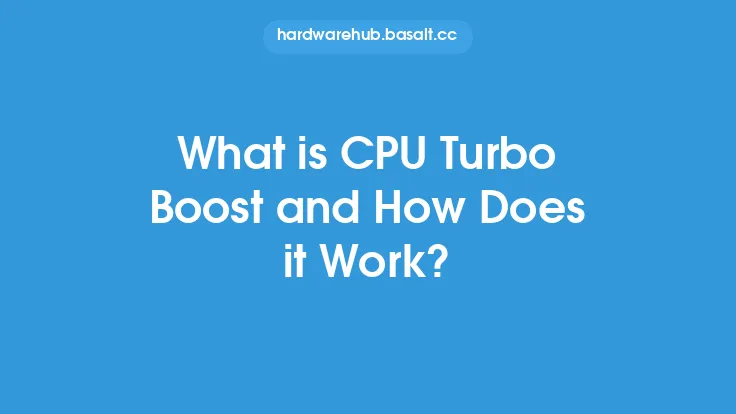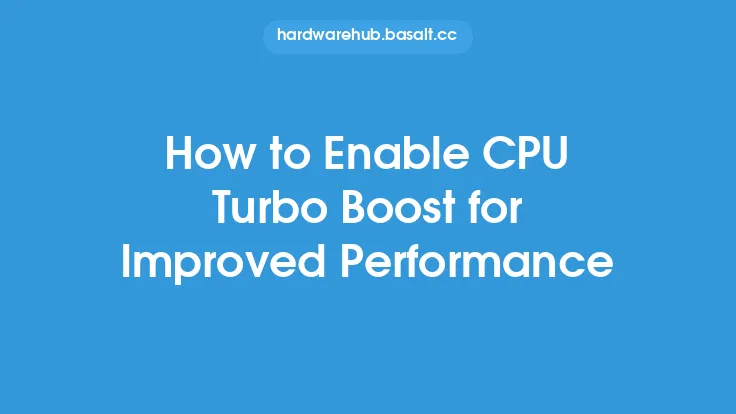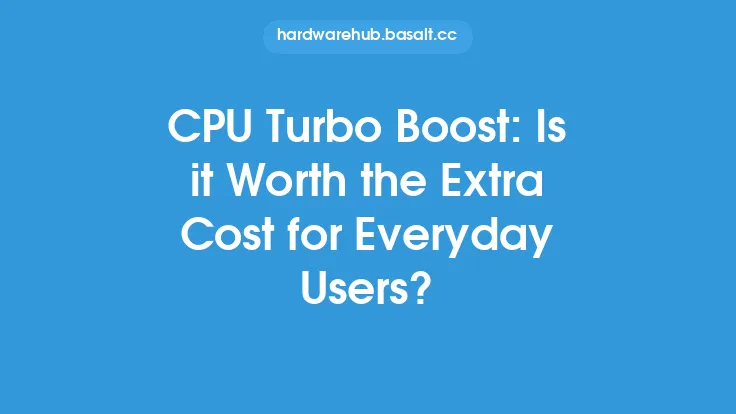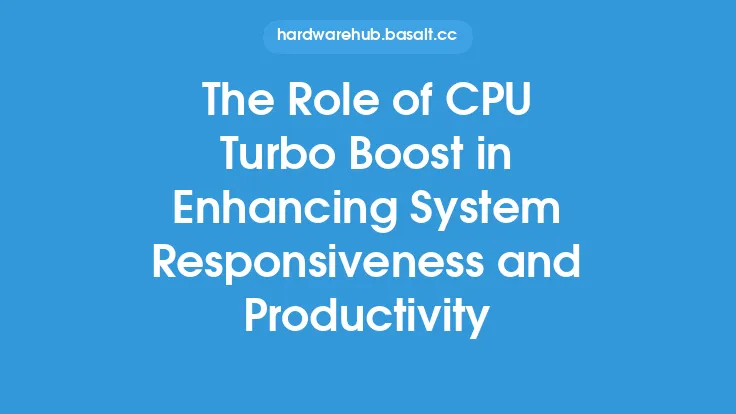When it comes to gaming and video editing, having a powerful CPU is essential for smooth performance and efficient processing. One feature that has gained popularity in recent years is CPU Turbo Boost, which allows the processor to temporarily increase its clock speed to handle demanding tasks. But do you really need CPU Turbo Boost for gaming and video editing? In this article, we'll delve into the details of CPU Turbo Boost and its impact on these applications.
Introduction to CPU Turbo Boost
CPU Turbo Boost is a technology developed by Intel that enables the processor to dynamically adjust its clock speed based on the workload. When the system demands more processing power, the CPU can increase its clock speed to handle the task, and then return to its normal speed when the demand decreases. This technology is designed to provide a boost in performance when needed, without significantly increasing power consumption or heat generation.
Gaming Performance with CPU Turbo Boost
For gamers, a fast CPU is crucial for smooth gameplay and responsive performance. CPU Turbo Boost can provide a significant boost in gaming performance, especially in games that rely heavily on CPU processing. When a game demands more processing power, the CPU can increase its clock speed to handle the task, resulting in faster frame rates and reduced lag. However, the impact of CPU Turbo Boost on gaming performance depends on various factors, such as the type of game, system configuration, and graphics card.
In general, CPU Turbo Boost can benefit games that are CPU-bound, such as strategy games, simulations, and games with complex physics engines. For example, games like Civilization VI, Stellaris, and The Witcher 3 can take advantage of CPU Turbo Boost to improve performance. On the other hand, games that are graphics-bound, such as first-person shooters and racing games, may not benefit as much from CPU Turbo Boost, as the graphics card is the primary bottleneck.
Video Editing Performance with CPU Turbo Boost
Video editing is another application that can benefit from CPU Turbo Boost. Video editing software like Adobe Premiere Pro, Final Cut Pro, and DaVinci Resolve rely heavily on CPU processing to handle tasks such as video encoding, color grading, and effects rendering. CPU Turbo Boost can provide a significant boost in video editing performance, especially when working with 4K or high-resolution video footage.
When editing video, the CPU is responsible for handling tasks such as video decoding, encoding, and rendering. CPU Turbo Boost can help speed up these tasks, resulting in faster export times and improved overall performance. Additionally, CPU Turbo Boost can also help with other tasks such as color grading, audio editing, and visual effects rendering.
Technical Requirements for CPU Turbo Boost
To take advantage of CPU Turbo Boost, your system needs to meet certain technical requirements. First, you need a CPU that supports Turbo Boost, such as Intel Core i5 or i7 processors. You also need a motherboard that supports Turbo Boost, as well as a power supply that can handle the increased power demands.
In terms of specific technical requirements, CPU Turbo Boost typically requires a CPU with a high clock speed, a large cache, and a high number of cores and threads. For example, the Intel Core i9-11900K processor has a base clock speed of 3.2 GHz and a boost clock speed of up to 5.0 GHz, making it an ideal candidate for CPU Turbo Boost.
Alternatives to CPU Turbo Boost
While CPU Turbo Boost can provide a significant boost in performance, it's not the only way to improve gaming and video editing performance. Other alternatives include overclocking, which involves manually increasing the clock speed of the CPU, and using a high-performance graphics card, which can handle graphics-intensive tasks.
Additionally, some CPUs, such as AMD Ryzen processors, offer alternative technologies like Precision Boost and XFR (Extended Frequency Range), which can provide similar performance benefits to CPU Turbo Boost. These technologies can offer improved performance and power efficiency, making them a viable alternative to CPU Turbo Boost.
Conclusion
In conclusion, CPU Turbo Boost can be a valuable feature for gamers and video editors who need a boost in performance. While it's not essential for everyday users, it can provide a significant improvement in performance for demanding tasks like gaming and video editing. However, the impact of CPU Turbo Boost depends on various factors, such as the type of application, system configuration, and technical requirements.
If you're in the market for a new CPU, it's worth considering a processor that supports Turbo Boost, especially if you're a gamer or video editor. However, it's also important to consider other factors, such as the type of motherboard, power supply, and graphics card, to ensure that your system can take full advantage of CPU Turbo Boost. Ultimately, CPU Turbo Boost is a powerful technology that can provide a significant boost in performance, but it's not a replacement for a well-rounded system configuration.





